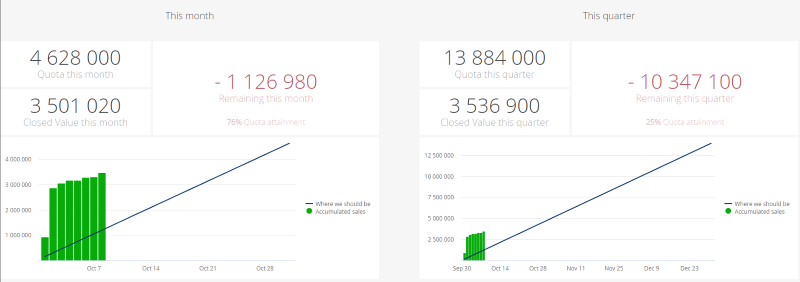
As a leader of a sales team, strengthening team morale, keeping up to date with your team’s numbers, and pipelines are necessary to keep the selling machine running as smoothly as possible. Ultimately, it’s all about closing deals and hitting the revenue target.
Great sales managers leave nothing to chance. Working in sales, we want to save time to focus on generating leads and closing deals. Some may argue that it’s time-consuming to repeat the current information in your CRM. However, we disagree.
We believe that by growing together, we’ll create magic together. The sales manager should, therefore, coach all sales reps and get an overview of the sales forecast so that all reps are up to date with their own and other reps status. In sales, it’s fun with a little bit of competition.
Plan the meeting
It’s not rocket science. Choose a meeting tool of choice, invite all involved members, pick a meeting location, and execute. At Upsales, we’ve set strict and rigorous guidelines for how weekly forecast meetings look like. The main reason to hold a weekly forecast meeting is that it keeps everyone informed, and reports are closely monitored. Otherwise, there’s a risk that figures get misreported, exaggerated, or even fabricated. Sales reps who haven’t reached their target may feel the need to withhold bad news. According to an article in Harvard Business Review, this is one of the reasons that sales forecasting inaccuracies happen.
Take the stage
The person who arranges the sales forecasting meeting should be the one starting it off. Initially, it’s the sales manager’s job. After inviting everyone from the CEO down to ground level sales reps, everyone in the meeting should get involved, and feel as if they’re part of the decision-making process. Don’t fall for the temptation to discuss new strategies and sales directions. Stick to a strict plan. This meeting needs to operate under the highest disciplinary standards. We recommend setting a general outline.
- Revenue closed for the month so far + the target for the month (MRR)
- Revenue closed for the quarter so far + the target for the quarter (QRR)
- Revenue closed for the year so far + the target for the year (ARR)
Show insights
As a sales manager, you should discuss any closed deals since the last forecast meeting and bring prepared summaries of each deal. It helps to look at the revenue charts as you talk about the results. Keep the agenda laser-focused so that everyone is aware of the current situation. That way, everyone is held accountable, and the team can be driven to succeed. Just as the sales manager show insights into the company revenue, each sales rep should go through every opportunity in his/her active pipeline in a similar fashion by covering the following:
- Go through deals that have been closed since the last meeting. For every deal, the responsible sales rep must present details short and to-the-point.
- How many meetings or opportunities that are created vs. how many meetings they’ve had since the last meeting.
- All sales reps must know the exact status and numbers of each deal they own. Check the insights chart and determine who they best can reach the monthly, quarterly, or annual target if they haven’t already.
End on a positive note
As the sales manager, open the floor to any other business, comments, or questions. That way, all the important information or misunderstandings can be addressed there and then. Encourage the team to sell, book meetings, and hit the target.
We hope this guideline was useful to you. At Upsales, we’ve gathered some report tools to help you structure the perfect weekly forecast meeting. Read this article.
